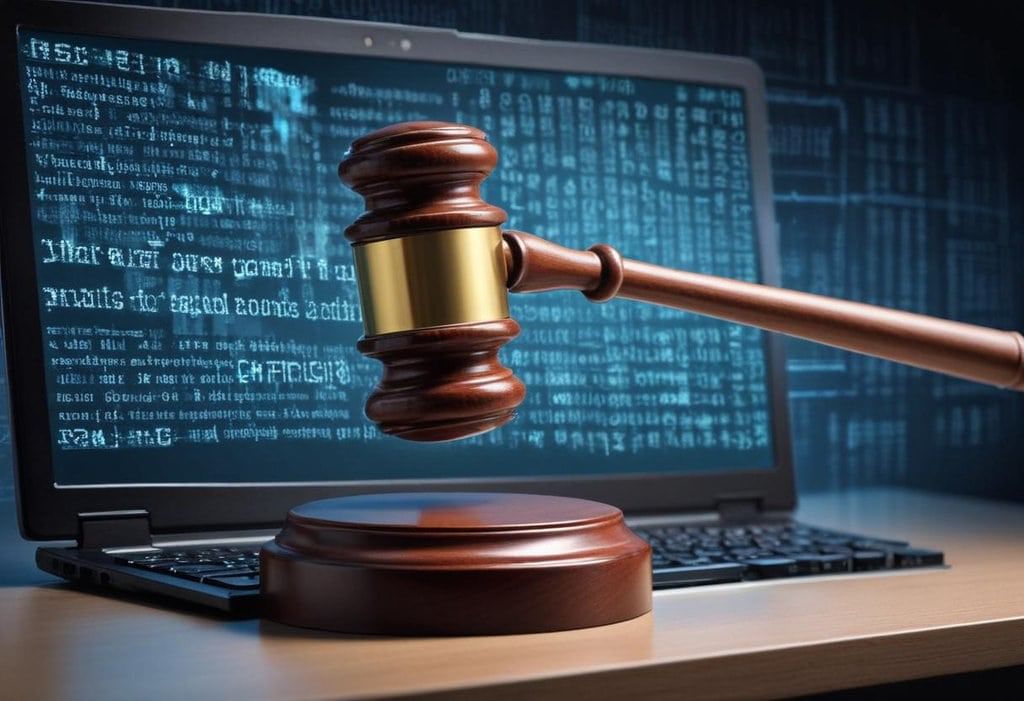Cyber Crimes & Penalities | Crash Course for UGC NET Commerce PDF Download
| Table of contents |

|
| Overview of Cybercrime Penalties in India |

|
| Cyber Crime |

|
| Cyber Crime Penalties |

|
| Cyber Crime Law Penalty |

|
| Cyber Crime Penalties in India |

|
Overview of Cybercrime Penalties in India
Introduction to Cybercrime Penalties- Penalties under Indian laws are designed to combat various cyber crimes.
- Their purpose is to discourage potential offenders, punish convicted individuals, and protect citizens from online dangers.
Challenges in Implementing Cybercrime Penalties
- Despite strict fines, enforcement and awareness pose significant challenges.
- Enhanced understanding of cyber security practices is crucial to prevent cyber attacks effectively.
Cyber Crime

Here are some common types of cyber crimes:
- Hacking: Unauthorized access to a computer or network with the intention to cause harm. Hackers may steal data, install malware, or disrupt systems.
- Data Theft: Stealing sensitive data like usernames, passwords, financial information, or trade secrets from computers or networks.
- Identity Theft: Misusing a person's private details such as name, date of birth, address, or credit card information for fraudulent activities.
- Cyberstalking: Using electronic devices or the internet to stalk or harass a person, which can include sending intimidating emails, text messages, or posts.
- Phishing and Fraud: Tricking individuals into sharing sensitive information like bank details or passwords through emails, texts, or fake websites.
- Malware Deployment: Deliberately spreading viruses, worms, Trojan horses, etc., to damage computers, networks, or steal data.
- Denial of Service Attacks: This involves overfilling servers or networks with the intention of disrupting online services for legitimate users. Such attacks can render websites or online services inaccessible to users, causing significant disruption.
- Posting Illegal Content: Individuals engage in this cybercrime by uploading or sharing obscene, slanderous, or hateful material online, which is prohibited under Indian laws. Such actions can lead to legal consequences due to the violation of regulations.
- Cyber Terrorism: Cyber terrorism refers to the use of cyber means to jeopardize national security, instigate mass unrest, or spread terror among the population. These acts pose serious threats to a country's stability and safety.
Cyber Crime Penalties
Cybercrime is becoming increasingly prevalent in India with the growing number of individuals and organizations operating online. To combat this issue, the government has implemented stringent laws and penalties for cybercriminals. The primary legislation governing cybercrimes is the Information Technology Act of 2000, which identifies various cyber offenses and specifies corresponding penalties. Additionally, penalties under sections of the Indian Penal Code related to offenses like adultery and forgery are also applicable to cybercrimes. Despite the existence of strict penalties under Indian laws, effective enforcement remains a significant challenge. Enhancing public awareness and understanding of cybersecurity is essential to reinforce legal deterrence against cybercrimes.
Objectives of Cybercrime Penalties
- Deter potential cyber criminals: Higher fines are imposed to dissuade individuals from engaging in illegal online activities.
- Punish convicted offenders: Imprisonment terms and fines are designed to ensure that cyber criminals face appropriate consequences for the harm they cause.
- Protect internet users: Severe penalties aim to make cybercrime a high-risk, low-reward activity, thereby reducing threats to ordinary netizens.
Offences and Penalties Defined by the IT Act
- The IT Act outlines various offenses related to cybercrime, including but not limited to:
- Hacking and tampering with computer source codes for fraudulent purposes can result in imprisonment for up to 3 years and a fine of up to Rs. 5 lakh.
- Publishing obscene electronic content may lead to imprisonment for up to 5 years and a fine of up to Rs. 10 lakh.
- Cybercrimes that pose a risk to national security can warrant life imprisonment.
Cyber Crime Law Penalty

Cyber Crimes Defined
The IT Act delineates several cyber crimes, including:
- Hacking computers or computer systems
- Publishing or transmitting obscene material electronically
- Identity theft and fraud
- Cyberstalking
- Publishing content with the intent to threaten national security
- Unauthorized electronic access to protected systems
Penalties for Cyber Crimes
The penalties outlined in the IT Act for cyber crimes are designed to penalize offenders and dissuade potential cybercriminals. These penalties typically involve fines and may include:
- Hacking computers for fraud: 3 years imprisonment and a Rs.5 lakh fine.
- Publishing obscene electronic content: 5 years imprisonment and Rs. 10 lakh fine.
- Cyber crimes affecting national security: Life imprisonment.
- Other cyber crimes: Up to 3 years imprisonment, fines, or both.
Purpose of Penalties
The penalties serve the following purposes:
- Deterrence: Stricter penalties aim to discourage cyber crimes.
- Punishment: Imprisonment and fines are meant to adequately punish convicted cybercriminals.
- Protection: Stringent penalties make engaging in cybercrime a high-risk activity, safeguarding ordinary citizens.
In essence, the Information Technology Act delineates various cyber offenses and imposes severe penalties, including fines and imprisonment, to punish cyber criminals and dissuade potential wrongdoers, thereby addressing the escalating threat of cybercrime in India.
Cyber Crime Penalties in India
Some common cybercrimes and their corresponding penalties have been stated below.
- Unauthorized Access to Computer Systems (Section 43)
- Penalty: Those gaining unauthorized access to computer systems can be liable to pay compensation for damages up to one crore rupees to the affected individual.
- Unauthorized Access with Intent to Commit or Facilitate Commission of Further Offense (Section 43A)
- Penalty: Individuals engaging in unauthorized access with the intent to commit or facilitate further offenses may face compensation for damages up to five crore rupees to the affected party.
- Unauthorized Modification of Content (Section 66)
- Penalty: Those involved in unauthorized modification of content could face imprisonment for up to three years, a fine of up to two lakh rupees, or both.
- Data Theft (Section 66B)
- Penalty: Perpetrators of data theft may be imprisoned for up to three years and fined up to five lakh rupees.
- Identity Theft (Section 66C)
- Penalty: Individuals engaging in identity theft may face imprisonment for up to three years and a fine of up to one lakh rupees.
- Impersonation (Section 66D)
- Penalty: Those involved in impersonation may face imprisonment for up to three years and a fine of up to one lakh rupees.
- Publishing or Transmitting Obscene Material in Electronic Form (Section 67)
- Penalty: Those publishing or transmitting obscene material electronically may face imprisonment for up to three years and a fine of up to five lakh rupees.
- Child Pornography (Section 67B)
- Penalty: Offenders involved in child pornography may face imprisonment ranging from five to seven years and a fine.
- Cyber Terrorism (Section 66F)
- Penalty: Perpetrators of cyber terrorism may face life imprisonment.
- Unauthorized Interception (Section 69)
- Penalty: Unauthorized interception could lead to imprisonment for up to three years, a fine, or both.
- Failure to Protect Sensitive Personal Data (Section 43A)
- Penalty: Those failing to protect sensitive personal data may be liable to pay compensation for damages up to five crore rupees to the affected individual.
Conclusion
India has stringent cybercrime penalties outlined in the IT Act to punish cyber criminals, deter potential offenders, and safeguard internet users. However, enforcing these laws effectively remains a significant challenge. In addition to legal deterrence, there is a critical need for greater awareness of cybersecurity. While the penalties aim to discourage cybercrimes, a comprehensive approach involving technological investments, enhanced resources and workforce for law enforcement, increased cybersecurity awareness campaigns, judiciary capacity building, and international collaboration is essential to truly reduce cybercrime incidents in India.
|
237 videos|236 docs|166 tests
|
FAQs on Cyber Crimes & Penalities - Crash Course for UGC NET Commerce
| 1. What are the penalties for cybercrime in India? |  |
| 2. What are some common types of cybercrimes that can lead to penalties in India? |  |
| 3. Can individuals be held accountable for cybercrimes committed in India? |  |
| 4. Are there any specific laws in India that govern cybercrimes and their penalties? |  |
| 5. How can individuals protect themselves from committing cybercrimes and facing penalties in India? |  |















